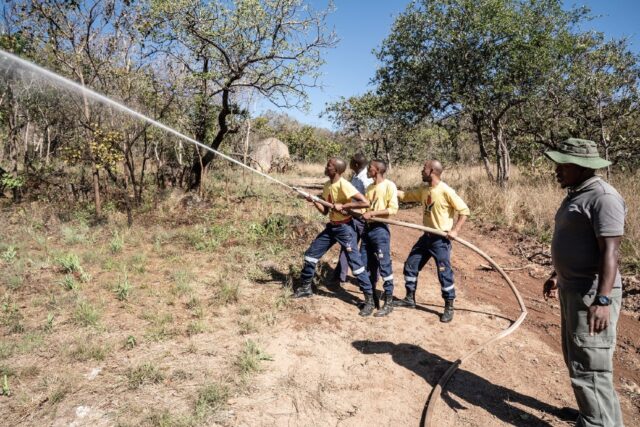Under a scorching sun, 200 South African firefighters wrapped up a last round of training on Tuesday before flying out to help Canada battle unprecedented forest blazes there.
It is a rare offer of aid from a developing country battling its own crises.
They are a second batch of fighters flying out to the north American nation where nearly 17,800 square miles of forest have burned since the beginning of the year, well above previous averages, amid climate change.
The first group of more than 200 South African firefighters deployed to Canada’s province of Alberta early last week.
The deployment is in response to “an urgent request” from the Canadian forest fire agency, according to South Africa’s ministry of forest and environmental affairs.
In the last month fires have erupted in almost every province across Canada and Prime Minister Justin Trudeau has acknowledged: “Our resources are stretched.”
As a consequence, Canada has had to juggle resources and call in reinforcements from abroad.
South Africa is just one of the nations coming to Canada’s aid, with Australia, the United States, Mexico, New Zealand, France, Spain and Portugal also among those sending firefighters.
Canada and South Africa in 2019 signed a memorandum of understanding “to assist each other in case of emergency regarding veld and forest fires,” Peter van de Merwe, a forestry scientist who will be leading the group, told AFP in the eastern city of Mbombela, where the team has been preparing for its mission overseas.
‘Prepared and excited’
The firefighters are from ‘Working on Fire’, an organisation funded by the country’s environmental ministry that recruits and trains unemployed people aged between 18 and 35.
Dubbed Mzanzi Hotshots-2 the “highly qualified” firefighters will leave for Edmonton, Canada on Wednesday.
They are “well prepared and excited” to go, remarks van de Merwe on the sidelines of the training.
Drawn from every corner of the South Africa, many from impoverished backgrounds, fewer than 20 of the firefighters have ever been abroad.
“It will be a big pleasure to represent my country,” Pontsho Lefifi, 27, told AFP surrounded by bushes and greenery at the remote training camp, 300 kilometres northeast of Johannesburg.
It is “an opportunity for everyone to see that I’m… (one of) the 25 percent of women” in the group gearing up for to quell the raging fires in Canada, said the proud 27-year-old mother of one from the capital Pretoria.
Working on Fire currently has over 5,300 firefighters with more than a third being female, one of the highest percentage of women in any firefighting organisation in the world.
‘We will do it’
At a dam nearby, the exhilaration is palpable as a small group practise pumping water into a hose.
“Go Mbokodo!” a male member of the teak shouts, using a colloquial term for a young woman, as a female firefighter waves a hose into the bushes.
For many of the firefighters this is more than just a job, in a country reeling under a 32,9 percent unemployment rate, one of the highest in the world.
This is an opportunity to help “put food on the table”, said one of the crew managers, Komane Sewetsi, 35, who has spent most of his adulthood jobless.
“Everybody is feeling grateful because of… the experience we are going to get there and knowledge we are going to gain,” added Sewetsi, father of two from the semi-rural town of Lebowakgomo in the northeast.
The group breaks into a song to encourage two firefighters as they begin to climb a combat wall.
Others practice rapidly coiling the fire hose back up, or run carrying twenty-kilogramme bags of equipment.
The lyrics, accompanied by synchronised steps by the team all dressed in blue-and-yellow, builds the team’s “morale” and “creates motivation”, Sewetsi said.
Singing “brings the team together,” despite their different languages and backgrounds and helps them remember that “it doesn’t matter if it’s hard, we will do it,” he explained.
Despite South Africa entering its own fire season which starts around mid-June and battling a crippling energy crisis, van de Merwe said the deployment was “important” and “will be good exposure for our firefighters”

COMMENTS
Please let us know if you're having issues with commenting.